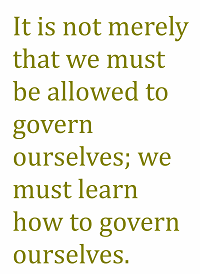Program Area 1. Advancing the Practice of Democracy as a Creative Experience
Philosophy, Theory, and Collaboration
Activities in this area will include conferences and more frequent symposia centered around the theme of democracy as a creative experience, Follett’s philosophy and legacy, and ideas and initiatives inspired by or complementary to Follett’s philosophy and legacy.
Follett Talks
Follett Talks will be a series of online discussions featuring presentations and discussions on Follett-related and Follett-inspired ideas, research, and initiatives. The Call for Presenters can be downloaded here. Visit the Events page to see the schedule of upcoming Talks and recordings of previous Talks.
2026 Mary Parker Follett Conversation on Creative Democracy
This will be an in-person, multi-day conference designed around inquiry and dialogue. A Call for Proposals for Teams has been posted on the Conference page. Further announcements about schedule, location, and teams will be posted on the Conference page in the future.
Advocacy and Capacity-Building
From Static Civics to Living Civics
Nearly all calls for improved civics/citizenship education in the United States are centered around improving students’ knowledge of government, the Constitution, and rights and principles like freedom and justice for all, without regard to actual experience in doing democracy–i.e., in working with others to address situations, create solutions, and to develop goals and vision, in everyday contexts like school, neighborhood, and local community. Without that experience, students are far less likely to graduate with the skills and dispositions for active and engaged citizenship. From Static Civics to Living Civics would promote a more hands-on and minds-on emphasis in civics education curricula, standards, and content, and on disseminating examples of such practice, both historical and contemporary.
emphasis in civics education curricula, standards, and content, and on disseminating examples of such practice, both historical and contemporary.
Declaration of Interdependence Contest for K-12 Schools
2026 is the 250th anniversary, or “semiquincentennial,” of the signing of the US’ Declaration of Independence. That breaking free from tyrannical reign was a critical moment in the history of humankind’s movement toward democracy. But while the United States gained independence in one historical moment; from that point onward, interdependence became our next challenge, and opportunity. We are stronger when we acknowledge that we need each other, that we can use difference as strength, use it to create new opportunities and fresh solutions to challenges.
This applies from the personal scale up to the global, particularly in a highly interconnected world. Interdependence deserves attention on this special anniversary. Beginning in fall 2026, the Declaration of Interdependence Contest will invite schools and classrooms across the United States to draft Declarations of Interdependence to coincide with America’s 250th birthday.
Beyond Parties, Between Elections
The focus of Beyond Parties, Between Elections is to grow the capacity for participatory democracy in formative and ultra-local settings like home, neighborhood, school, and town hall.
Renewing Our Institutions and Our Society through Participatory Design
The societal capacity that the late Bela H. Banathy called the participatory design of social and societal systems is glaringly absent yet arguably one of the most urgent needs of our times. It extends the concept of democracy to the very design of our social systems and institutions, by the users of those systems and institutions, to ensure goodness of fit between those systems and people’s needs and aspirations. This includes our education, health care, justice, government, economic, and other systems and institutions.
Until we recognize the need for our systems and institutions to be based on a living design, with that design centered around the needs and aspirations of everyone who is affected by those systems, and informed by the best available knowledge at our collective disposal, we will continue to rely on systems and institutions that were designed in and for different eras, and designed for people rather than with those served. Too often, these legacy systems and institutions tend to be resistant to change, are based on unexamined assumptions, and continue to fall behind the realities and needs of the world today, let alone help society advance in the direction that it may wish to.
Building the capacity for participatory design goes hand in hand with building capacity for dialogue and participatory democracy, and requires building what Banathy referred to as design literacy and design competence.
One project we are seeking to pilot combines our interest in building the capacity for participatory design with our interest in supporting the learning of democracy as a way of life through meaningful K-12 civics education. This project, called Learning to Create Together, is described in greater detail in the document linked here.
Program Area 2. The Legacy of Mary Parker Follett
Extending Access to Follett’s Literary and Intellectual Legacy
Program activities will be announced as they are developed and implemented.
